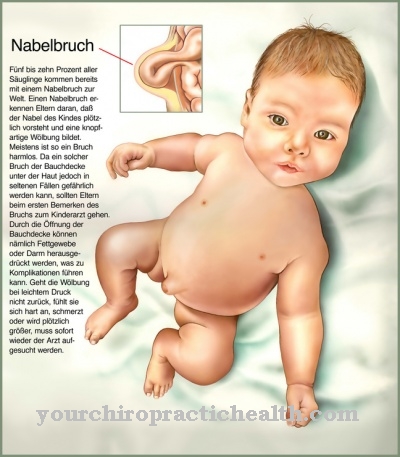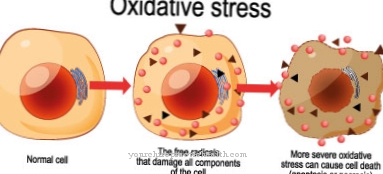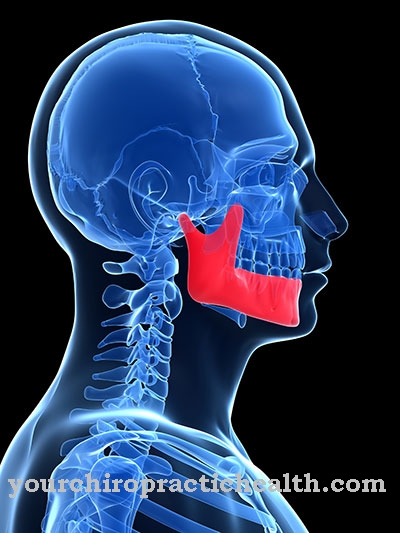A pronounced one Copper deficiency is very rare, as copper is sufficiently available in food. Copper is an essential trace element in numerous enzymes and is also closely linked to the iron metabolism. A lack of copper leads to anemia and immunodeficiency.
What is copper deficiency?

© happy_lark - stock.adobe.com
In the industrialized countries there is a pronounced one Copper deficiency very rarely before. The daily copper requirement in humans is 1.5 to 3 mg. There is a lot of copper in nuts, meat, seafood, cereals and beans. The higher the physical strain, the higher the copper requirement. It is mainly excreted in the urine. The body can store between 40 mg and 80 mg of copper. Both too low and too high copper concentrations lead to health disorders.
Copper is a central trace element that controls many metabolic processes. It is contained in many enzymes that protect against reactive oxygen, that support dopamine formation and that are responsible for elastin and collagen synthesis. It is also closely related to the metabolism of vitamin C and controls the absorption of iron from food. Due to these diverse functions of copper, a pronounced copper deficiency has a very negative effect on the organism.
causes
The causes of a copper deficiency are very diverse. The main cause is the reduced copper intake from food. In the industrialized countries there is an adequate food supply so that the copper requirement is usually met. In developing countries, copper deficiency is a major problem due to insufficient food supplies. However, malnutrition can also lead to it.
In the case of malnutrition, sufficient food is available, but the one-sided consumption of low-copper foods can lead to a copper deficiency. Other causes can be eating disorders and alcoholism. Older people in particular are at risk of suffering from a copper deficiency because, for various reasons, they can no longer eat normally. However, there are other deficiencies besides the copper deficiency.
Medicines can also hinder copper absorption. Preparations that are particularly rich in zinc inhibit the absorption of copper. Certain diseases that are associated with malabsorption of the food components, such as chronic gastrointestinal diseases or celiac disease, can also cause a copper deficiency. Hereditary diseases such as Wilson syndrome or Menkes syndrome also lead to low copper concentrations in the blood.
Wilson syndrome is a copper storage disorder and Menkes syndrome disrupts copper uptake. In the case of severe injuries with blood loss, burns, certain illnesses or medication, the copper requirement is increased. If no more copper is supplied in this situation, there will also be a copper shortage.
Symptoms, ailments & signs
A pronounced copper deficiency manifests itself in an anemia, which is similar to an iron deficiency anemia. Not enough red blood cells are made. The copper deficiency causes a secondary iron deficiency due to a reduced absorption of iron from food, which can no longer be remedied even by oral administration of iron supplements.
The distribution of color in the skin changes. Furthermore, hair turns gray quickly, fatigue, paleness, poor performance and concentration problems and frequent infections. The bones become brittle. Above all, psychological problems such as depression are common. Often the copper deficiency occurs together with other deficiencies.
Diagnosis & course of disease
Since the pronounced copper deficiency is very rare, it is often not examined and diagnosed. To do this, blood tests must be carried out. The normal copper concentration in the blood is between 80 and 140 micrograms per 100 ml. Due to the many possible causes, a copper deficiency may not be all that rare.
However, a minor lack of copper does not cause any symptoms. The symptoms only appear when it is more serious. In these cases, however, in addition to the copper deficiency, other deficiencies such as iron deficiency appear.
Complications
A prolonged copper deficiency can cause various complications. First of all, a lack of copper causes tiredness and poor concentration as well as difficulty breathing. This increases the risk of accidents and rarely causes circulatory problems. Severe copper deficiency can lead to fainting and other complications.
Without copper, the immune system is also less efficient and there are more infections and skin diseases. The nervous system is weakened, which, for example, reduces fertility and growth disorders can occur. If the trace element copper is missing, this also leads to reduced iron absorption from food. This leads to headaches, dizziness, fatigue and a general decline in performance.
In the long term, physical complaints such as chapped lips, dry skin and brittle nails occur, which in turn can be associated with serious complications. Sometimes the physical changes can lead to psychological problems. Since a copper deficiency is difficult to diagnose as a cause, it can develop into protracted emotional suffering.
Food supplements with copper can cause allergic reactions and other complaints. In addition, a targeted intake of copper through dietary measures can lead to weight gain and a one-sided diet, each associated with further problems and complications.
When should you go to the doctor?
If symptoms such as fatigue, loss of appetite, and external changes are noticed, a doctor should be consulted. Signs of physical or mental weakness suggest a deficiency that needs to be diagnosed and treated. Since a copper deficiency can only be remedied in a targeted manner with an appropriate diagnosis, medical help must always be sought in the case of the symptoms mentioned. If there are repeated bone fractures or disorders of the central nervous system, the deficiency may have existed for a long time.
An immediate doctor's visit is necessary to avoid permanent damage. People who suffer from an eating disorder, alcoholism or chronic gastrointestinal diseases are very susceptible to deficiency symptoms. Patients with Wilson syndrome, Menkens syndrome and celiac disease also belong to the risk groups and should have signs of a deficiency examined immediately. If you have a copper deficiency, it is best to see your family doctor or an internist. If the disorder occurs as part of an existing illness, the responsible doctor must be informed. Further examinations and medication adjustments may be necessary during therapy.
Therapy & Treatment
Treatment for copper deficiency depends on the underlying cause. As a rule, treatment consists of sufficient oral administration of copper preparations. However, these must not be administered together with preparations or drugs containing zinc because zinc inhibits the absorption of copper. In the case of severe malabsorption, it may in rare cases be necessary to apply copper parenterally. Parenteral means that the intestine must be passed over for absorption. In these cases there is a particularly severe disruption of copper uptake in the intestine. If iron deficiency anemia is also present, iron must also be administered parenterally, because the copper deficiency prevents iron absorption in the intestine. The main causes of copper deficiency are serious illnesses in the industrialized countries. Malnutrition does not play a role here. However, eating disorders such as bulimia or anorexia can lead to copper deficiency. Hence, treating these eating disorders is a priority.
Other serious illnesses such as cancer, depression or dementia can also be associated with reduced food intake. Again, it is important to treat the underlying disease. Uptake disorders for copper are to be expected in severe gastrointestinal diseases and celiac disease. In addition to the parenteral administration of copper preparations, the prerequisite for an adequate copper supply is the healing of the relevant disease.
Outlook & forecast
The likelihood of suffering from copper deficiency is very low in the western world. The trace element is found in many foods that are widely available. A disease can also be successfully treated, which results in a good prognosis.
However, if there is a permanent copper deficiency, anemia and immune deficiency set in. In addition to typical physical complaints, the psyche also suffers. Because dry skin or brittle nails reduce the attractiveness. In the long term, non-treatment poses a risk for the entire human organism.
In the industrialized countries, the copper deficiency is often a consequence of serious illnesses. Cancer and dementia in particular are considered to be triggers. Treatment consists of oral administration of tablets containing the trace element. In severe cases, the intestine must be bypassed, which is not a problem according to the current state of science. Copper deficiency is usually treated as secondary. The main focus of doctors is on the causative disease. In the case of eating disorders and a tendency to a one-sided diet, the prospect depends on the willingness of the person concerned to cooperate. Because here the wrong food intake and problematic ideals cause the complaints.
prevention
The prevention of a copper deficiency consists in an adequate supply of the body with copper. This is usually not a problem because the food contains sufficient copper. If there are signs of eating disorders, medical advice should take place. Serious gastrointestinal diseases urgently need to be clarified and treated in order to prevent deficiency symptoms such as iron or copper deficiency.
Aftercare
In contrast to, for example, a tumor disease, follow-up care is usually not part of the therapy if a copper deficiency is detected. This is mainly due to the fact that the risk of illness in the western industrialized countries is minimal and can easily be remedied with suitable medication. The supply situation could hardly be better for avoiding illness.
A balanced diet is sufficient to prevent recurrence. However, this does not fall within the remit of the health system; rather, the patient has to adapt to his everyday life. If necessary, a nutritional consultation can be attended. Long-term treatment is only necessary in cases where other diseases are causing the copper deficiency. Eating disorders, cancer and depression can cause the typical symptoms.
Follow-up care consists of regular check-ups that are discussed with the attending physician. This refers to a symptom-related examination and a blood analysis. The patient also receives nutrition tips and other recipes. Scheduled follow-up examinations therefore do not play an essential role in the western industrialized countries after a diagnosed copper deficiency. They only take place in the case of permanent and severe underlying diseases in order to prevent complications.
You can do that yourself
A balanced diet is usually sufficient to compensate for a copper deficiency. Those who experience the typical symptoms should mainly consume mushrooms, whole grain products, liver and mussels. Iron-containing foods such as nuts, cabbage, lentils and oat flakes also alleviate the symptoms and prevent the accompanying iron deficiency.
In the case of a pronounced copper deficiency, the doctor can also prescribe food supplements containing copper. In addition, a healthy lifestyle should be aimed for. Regular exercise and a good diet strengthen the entire organism and help to regulate deficiency symptoms in a natural way. A food diary can also help identify symptoms early and prevent deficiency symptoms before severe physical and psychological complaints occur.
Anyone who has difficulty putting together a balanced diet should speak to a specialist or a nutritionist directly. This is particularly useful if you have an eating disorder, cancer, depression, dementia or another chronic disease that promotes a copper deficiency. In the case of an initial underlying disease, you should also consult your doctor. He or she can monitor the diet and give further tips and measures to counteract a copper deficiency.



























